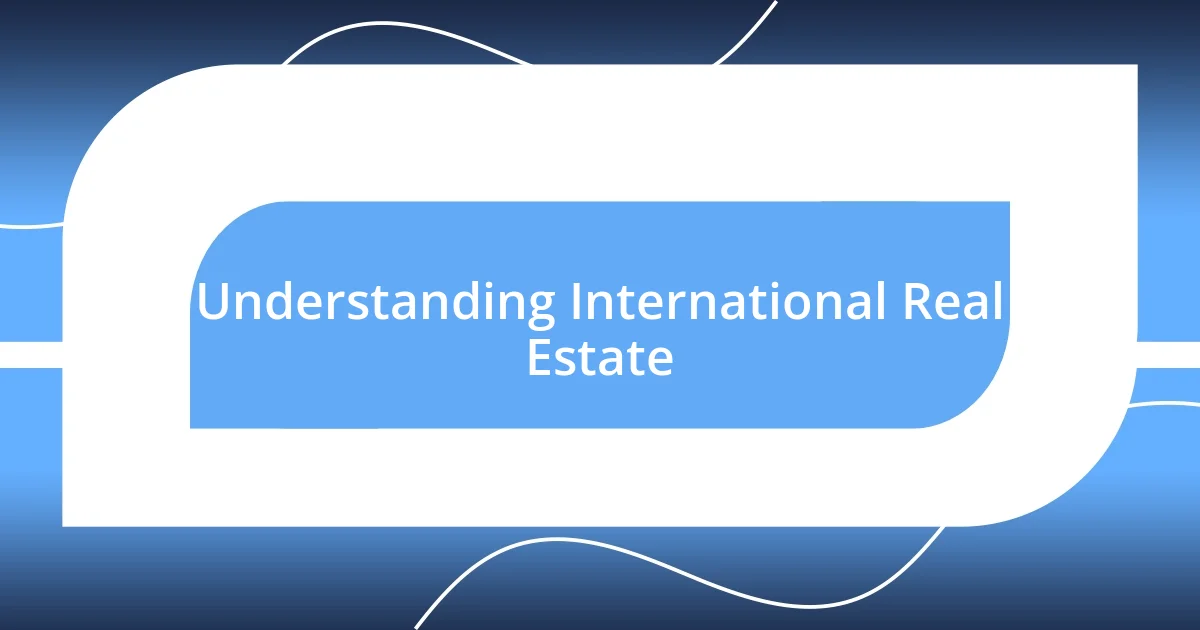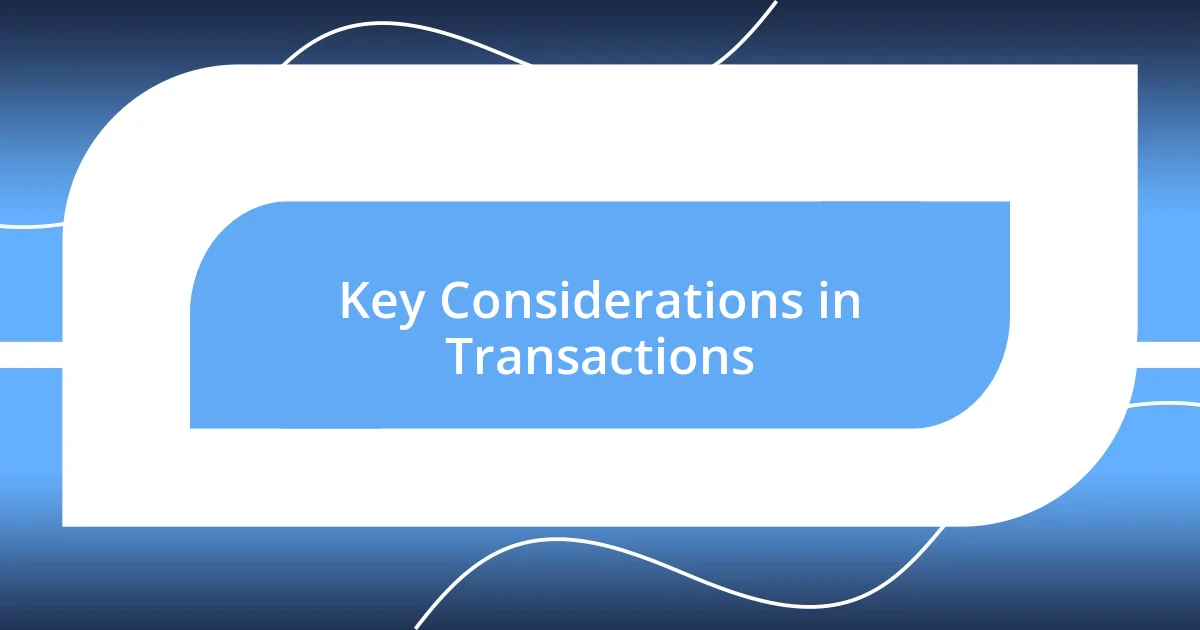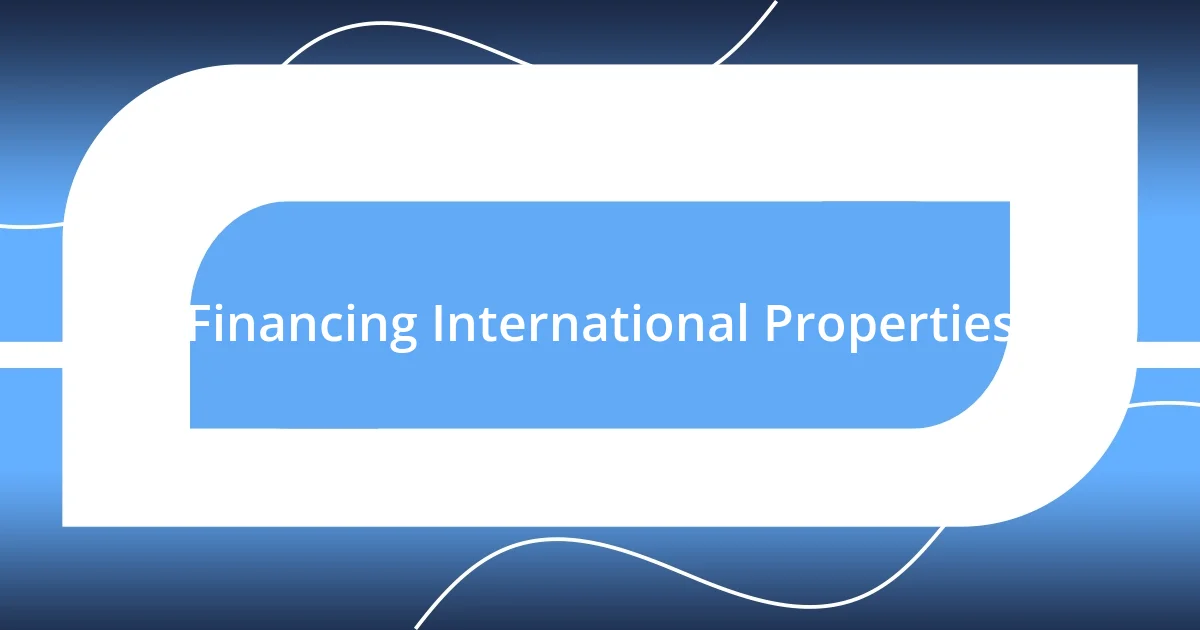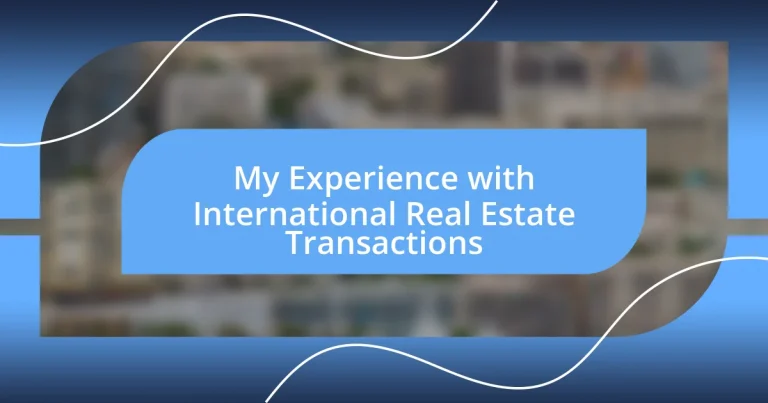Key takeaways:
- Understanding local laws, cultural nuances, and market dynamics is crucial for successful international real estate transactions.
- Building a support system with local experts can provide invaluable insights, mitigate risks, and enhance negotiation strategies.
- Patience and adaptability are essential virtues; they enable investors to navigate complexities and capitalize on opportunities in diverse markets.

Understanding International Real Estate
Navigating the world of international real estate can be both fascinating and intimidating. I remember my first overseas property purchase; the thrill of exploring different cultures and markets was electrifying. But I soon realized that understanding local laws, customs, and market dynamics is crucial. How do you even begin to grasp regulations that vary wildly from one country to another?
In my experience, each country presents its own unique set of challenges and opportunities. For instance, when I invested in a property in Spain, I was struck by the importance of understanding the bureaucratic labyrinth surrounding property transactions there. From notary fees to tax implications, there were aspects that surprised me, not to mention the emotional rollercoaster of buying sight unseen from afar. Reflecting on those moments, I often wonder: how do other investors overcome these hurdles?
Then there’s the language barrier, which can either be a minor hurdle or a major obstacle. I once found myself in a situation where a miscommunication nearly derailed a deal. Thankfully, I had a bilingual friend who stepped in. Without that support, would I have missed out on a fantastic opportunity? It’s experiences like these that highlight the importance of having a solid support system when diving into international real estate.

Key Considerations in Transactions
When diving into international real estate transactions, one of the key considerations is understanding local laws and regulations. Each country can have vastly different legal frameworks, and if you don’t take the time to read the fine print, you could find yourself in a tricky situation. I remember the first time I overlooked a critical zoning law in Italy; it was a lesson learned the hard way, and it cost me both time and money.
Financial implications are another significant factor that often catches newcomers off guard. Things like currency exchange rates, international banking rules, and additional taxes can add layers of complexity. I vividly recall the stress of tracking fluctuating exchange rates during a property deal in Brazil. It felt like a high-stakes game, where every decision could dramatically affect my investment.
Lastly, let’s not forget about cultural differences that influence transaction processes. In some countries, negotiation can be more of an art than a science. I’ve experienced instances where the initial offer was merely a starting point for extensive back-and-forth, which was quite different from the more straightforward negotiations I was used to. These cultural nuances can sometimes lead to misunderstandings, which is why I’ve learned to approach every deal with an open mind and a willingness to adapt.
| Consideration | Details |
|---|---|
| Legal Framework | Understand local laws to avoid pitfalls. |
| Financial Implications | Account for taxes and currency fluctuations. |
| Cultural Differences | Be prepared for different negotiation styles. |

Researching Foreign Markets
When researching foreign markets, I find that having access to the right resources is paramount. I typically start with online platforms that provide market analyses and reports. I remember being amazed by the depth of information available; it felt like unlocking a treasure chest of insights. However, while data is essential, you must also weave in local knowledge. Connecting with locals—a property manager or a resident—can provide a context that statistics often miss.
Consider these useful strategies when researching foreign markets:
- Utilize Online Resources: Websites like Zillow or Realtor.com can offer insights into pricing trends.
- Engage Local Experts: A real estate agent from the area can provide invaluable information about neighborhood dynamics.
- Read Market Reports: Research publications can explain macroeconomic trends affecting real estate values.
- Join Forums and Groups: Engaging with other international investors can help you gather tips from their experiences.
- Visit in Person: If feasible, traveling to the market can offer firsthand insight and a deeper understanding of local culture.
Through each of these methods, my understanding of the complexities of foreign markets deepened, allowing me to anticipate potential hurdles.

Navigating Legal Requirements
Navigating the legal requirements in international real estate can feel like deciphering a complex puzzle. I once found myself tangled in a web of permits and local regulations in France, not realizing that I needed specific approvals for renovations. It’s a wake-up call that made me appreciate the necessity of involving local legal experts, as they can shine a light on areas that might seem straightforward but turn out to be anything but.
One aspect that surprised me was the varying levels of transparency in real estate laws across different countries. In some places, I felt like I was walking in the dark, while in others, the rules were clear and accessible. This disparity made me realize how crucial it is to do thorough background checks on documentation and ownership rights. How confident can you be in making an investment if you don’t fully understand the legal landscape? My experience taught me to never rush; due diligence pays off in the long run.
Additionally, I learned the hard way that language barriers can exacerbate legal challenges. When I was trying to navigate contracts in Spanish during a purchase in Mexico, misinterpretations almost led to a costly error. Engaging a bilingual attorney not only eased my worries but also provided peace of mind. Each hurdle faced is a lesson, and it’s vital to embrace the learning curve that comes with cultural and legal differences in international transactions.

Financing International Properties
Financing international properties can be quite the adventure, often filled with unexpected twists and turns. When I decided to invest in a rental property in Portugal, I was astounded to discover that my credit history from the United States hardly mattered. Instead, the bank focused on local income and area-specific financial health, which made me wonder—how do we really gauge our financial standing when playing the global real estate game?
The process often involves navigating through diverse financing options, from traditional mortgages to more creative solutions like seller financing or partnerships. I remember feeling particularly challenged by the down payment requirements in Spain, which were much higher than I anticipated. This experience taught me the importance of thoroughly understanding the financing landscape within each country, as it can vary significantly and influence your potential return on investment. What strategies could I have employed to better prepare myself?
Additionally, the exchange rates can play a massive role in how much financing you’ll ultimately need. I once faced a daunting scenario when the Euro strengthened against the dollar just before a deadline, adding thousands to my overall investment cost. It was a reminder that timing can be everything in international transactions. Thus, staying informed about currency fluctuations and utilizing tools like forward contracts to fix exchange rates can be crucial strategies that I now keep close to heart. Each challenge I encountered carved out new paths to explore, reinforcing my belief that adaptability is vital in this ever-changing landscape.

Working with Local Experts
One crucial lesson I learned while diving into international real estate was the undeniable value of working with local experts. When I was considering a property in Italy, I realized the importance of the local real estate agent who knew the intricate market dynamics of the neighborhood. It felt like having a trusted friend by my side, guiding me through everything from hidden fees to pricing strategies. Would I have made as informed a decision without that insider knowledge? I doubt it.
During my experience, I came to appreciate how local real estate agents not only have access to properties but also possess invaluable connections with legal advisors, mortgage brokers, and contractors. For example, in Brazil, my local agent introduced me to a reliable contractor who understood the unique preservation laws for heritage properties. Working with these experts provided me reassurance and a sense of community, making the entire process feel less daunting. It made me think—how much easier could navigating foreign markets become if we leaned on the wisdom of those who know them best?
I’ve also found that collaborating with local professionals can save you from costly mistakes that stem from cultural missteps. In one instance, while buying an apartment in Thailand, I was unaware of long-standing local customs related to property transactions. Thankfully, my local advisor shared insights on etiquette and expectations, helping me navigate the nuances smoothly. Without that support, I could have easily offended someone or missed vital negotiation points. It’s a reminder that sometimes, the most straightforward path isn’t the one you initially see—it’s the road paved with local knowledge that leads to success.

Lessons Learned from My Experience
One of the most significant lessons I learned was the importance of cultural awareness in international real estate. During a trip to Mexico to close on a beach property, I found myself bewildered by the negotiation style. The locals emphasized relationship-building over quick deals, and it took me a moment to adapt. Looking back, I realize how critical it is to respect and understand these cultural nuances; otherwise, you risk not just a failed transaction but also a lost opportunity for connection and growth.
Another eye-opening experience was realizing how pivotal language can be in these transactions. In Portugal, I initially relied heavily on English, but it was my local colleague who gently encouraged me to learn some basic Portuguese phrases. When I finally used them during meetings, I noticed a shift in how people engaged with me. It made me wonder—could mastering a few key phrases truly transform potential adversities into opportunities for collaboration? It absolutely did. The power of language opened doors and built trust, reinforcing my belief in the small but meaningful gestures that can elevate any international experience.
Lastly, I learned that patience truly is a virtue in the world of international real estate. When my offer was first rejected on a property in Greece, I felt disheartened. However, my local agent urged me to wait and reassess my approach. He suggested strengthening my offer with local insights, which ultimately led to us securing a better deal a few weeks later. This taught me that in this complex field, rushing often leads to regret, while taking the time to reflect can yield unexpectedly fruitful results. Patience allowed me to build a strategy rather than just a transaction, and I carry that lesson with me in every deal I consider now.














